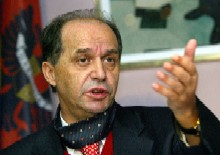Rugova's death leaves Kosovo to the mercy of fate
No one knows who is going to take the lead in the new government: moderate politicians or former gunmen from the Kosovo Liberation Army
A three-day mourning was announced in Kosovo because of the death of the 61-year-old President of Kosovo, Ibrahim Rugova. Rugova, who was considered to be a moderate politician, chaired the Democratic Union of Kosovo party. The politician advocated the region's independence on Serbia and Montenegro. Kosovo virtually obtained independence owing to Rugova's efforts and his appeals to peaceful reforms. Kosovo's infrastructure of tax collection, education and healthcare does not depend on Belgrade. Rugova became the President of Kosovo as a result of illegal elections held in 1992. The parliament of Kosovo approved an adequate resolution and Kosovo was pronounced an independent republic. 
Many politicians believe that Rugova's death may aggravate the complicated negotiations regarding the status of the southern Serbian province. The problem was supposed to be discussed on January 25. Ibrahim Rugova was expected to head the delegation of Kosovo Albanians who insisted on the republic's absolute independence on Serbia. The scheduled meeting in Vienna will have to be postponed now, at least for a month.
Ibrahim Rugova was born on December 2, 1944 in Crnce, Kosovo (then part of Italy-controlled Albania). He studied at the University of Pristina, the department of Albanian literature. Rugova was awarded the Sakharov Prize for his contribution to democracy. In 1989 he signed a decree to cancel amendments to the Constitution of Serbia, which abolished Kosovo's authority. Rugova founded the first party in the region in December of 1989 – the Democratic Union of Kosovo, which he presided over until his dying day. He was reelected the President of Kosovo in 2004.
Rugova enjoyed enormous popularity with Kosovo's Albanians because of his ardent devotion to the independence of the region. The politician had enemies too, of course – they were mostly radicals from the military wing of the so-called Liberation Army of Kosovo. Separatists repeatedly threatened Rugova and attempted to assassinate him. The leaders of Kosovo's Albanians stressed out on many occasions that the Balkan problem could be solved by means of acknowledging regional independence.
British officials support the idea of a certain form of independence for Kosovo too. They believe that it would be the best solution of the crisis taking into consideration the fact that ethnic Albanians make the majority of Kosovo's population. The rest of Europe seemingly shares the opinion. The head of the UN interim administration in the region, Sorena Jessena Petersena, said in an interview with The Financial Times that the process of the talks speaks for itself. According to the official, one will have to acknowledge the voice of the majority.
The pressure of ethnic Albanians may grow considerably. Who is going to become Rugova's successor? Who is going to head the Albanian delegation during the forthcoming talks in Vienna? Belgrade has already expressed its concerns in connection with possible mass riots among Kosovo's Albanians.
Kosovo Parliament Speaker Nexhad Daci, an ally of the deceased president, will take up Rugova's duties for the time being. The new President of Kosovo is to be elected during the coming three months. The date of the new presidential election in Kosovo is to be announced within two weeks.
Ex-Premier Ramush Haradinaj is said to become one of the first candidates for the position of the Kosovo President. The former field commander of the Kosovo Liberation Army, the commander of the Kosovo Armed Forces, still remains one of the most popular politicians among ethnic Albanians. His intention to run for the President in Kosovo last year received an extensive coverage in the world media. Haradinaj is suspected of committing war crimes in the 1990s. He may return to big politics during the time when Kosovo's Albanians are in dire need of a new “messiah.” Haradinaj's party – the Alliance for the Future of Kosovo – is in coalition with the Democratic Union of Kosovo, previously chaired by Ibrahim Rugova.
The incumbent chairman of the regional government, a member of the Alliance for the Future of Kosovo, Bayram Kosumi, the leader of the Democratic Party of Kosovo, Hashim Thaci, are said to be other most probable candidates to replace Rugova.
Another Albanian moderate politician, Veton Surroi, also has very good chances to lead Kosovo after Rugova. Surroi enjoys the support of Western states. He is the only Albanian politician, who intends to establish normal relations with Serbia.
Albanian analysts believe that the leading political forces of the region may establish a large coalition for the government. No one knows who is going to take the lead in the new government: moderate politicians or former gunmen from the Kosovo Liberation Army.
Discuss this article on Pravda.Ru English Forum
Subscribe to Pravda.Ru Telegram channel, Facebook, RSS!





